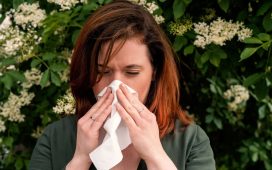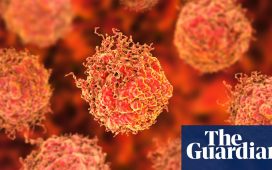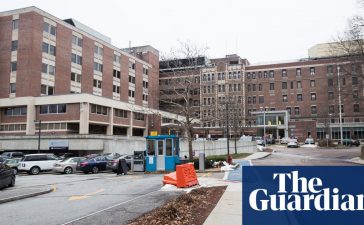Cross-sex hormones designed to masculinise or feminise a person’s body are available to buy online for less than £11 a month, with experts warning that growing numbers of under-18s may turn to the medicines hidden economy.
Last month the landmark Cass review of children’s gender treatment in England concluded there was a lack of reliable evidence supporting the use of cross-sex hormones and puberty blockers by young people questioning their gender identity.
As a result, provision of cross-sex hormones to under-18s is under review. The report said that while they can still be made available to patients from the age of 16, they should only be prescribed with extreme caution and a strong clinical rationale for not waiting until an individual reaches 18. The recommendations apply to the NHS and the private sector.
While trans adults are often prescribed such hormones, it is illegal to supply the drugs in the UK to adults or under-18s without a prescription.
Guardian research found online pharmacies in places ranging from India to Hong Kong and Portugal offering hormone treatments without a prescription, typically ranging from around £10 to £30 for 28 days’ supply of a starting dose of feminising hormones.
While some suppliers state their websites can only be used by people aged 18 and over, there appear to be few, if any, barriers to younger people making purchases.
There is also an extensive array of online sellers, some UK-based, who prepare mixtures of hormones themselves – often for injection – in a process known as “homebrewing”.
Cross-sex hormones are drugs used to change the body. For birth-registered females, testosterone can be administered by injection, through patches or via gels applied to the skin to produce changes such as the growth of facial hair and a deepening of the voice. Hormones including oestrogen can be given in tablets, injections, gels, sprays or patches to birth-registered males to promote changes such as the growth of breasts.
According to the Cass review, around 500 young people were on these hormones when they were discharged from the NHS Gender Identity Development Service (Gids) between April 2018 and December 2022.
Now concerns have been raised about the ease of availability of “DIY” hormones online, and whether young people might increasingly turn to the hidden economy, including drug dealers, to obtain the hormones illegally.
Dr Alison Cave, the chief safety officer at the UK’s Medicines and Healthcare products Regulatory Agency (MHRA), said: “Patient safety is our top priority, and we strongly advise that people do not self-prescribe or try to obtain medicines from an unregulated source.
“A prescription only medicine may only be sold or supplied lawfully in accordance with a prescription issued by an appropriate healthcare practitioner. It is also illegal to sell or supply unauthorised medicines.” The MHRA had not authorised any medicines for the treatment of gender dysphoria, she added.
Dr Aiden Kelly, a clinical psychologist who left Gids in 2021 and has since set up a private service, said he worried that “people in desperation will access care in unsafe ways”.
“We are already seeing patients coming to us where things have not been properly supervised and they have poor outcomes as a result. These are people who have either sought treatment abroad or online,” he said.
The Bayswater Support Group, which works with parents whose children have a transgender identity but opposes a “gender-affirmative” approach, said a public information campaign was needed.
“Vulnerable children and young adults must be told the truth about puberty blockers and cross-sex hormones: the evidence base is very weak, and there are known risks,” a spokesperson said.
Maria*, whose teenage daughter bought testosterone online and, later, from a drug dealer, said hormones should not be given without a prescription. “That doesn’t mean that therefore the NHS route should be made easier, and that all the safeguarding should be kicked to one side,” she said.
Maria added her daughter had since detransitioned. “The thing is, my daughter has been left with permanent physical damage from the testosterone that she took illegally off prescription – permanent damage that will never resolve, that she’s got to live with for the rest of her life.”
The Trans Safety Network said that since the sharp reduction in referrals to hormone experts for young people from 2020 onwards, there had been several inquests into suicides by young trans people, including judgments finding that a lack of access to healthcare was an aggravating factor.
“The near-removal of these pathways will lead to young people being exposed to risk and taking measures into their own hands,” a spokesperson said.
The group also raised concerns about cracking down on the “DIY” market for hormone therapy, saying it exists because of failures to provide safe, timely, monitored and supported access to treatment.
“Any attempt to ban online distributors will further push young people away from the commonly used grey market online pharmacies with legitimately manufactured medications via countries where these medications are available over the counter, to less established sources, with unknown additional risks,” the spokesperson said.
The Department of Health said the MHRA monitors online channels and, where possible, works with partners to disrupt the illegal trade in human medicines. “We are looking closely at what can be done to curtail any loopholes, including legislative,” a spokesperson said.
*Name has been changed.











